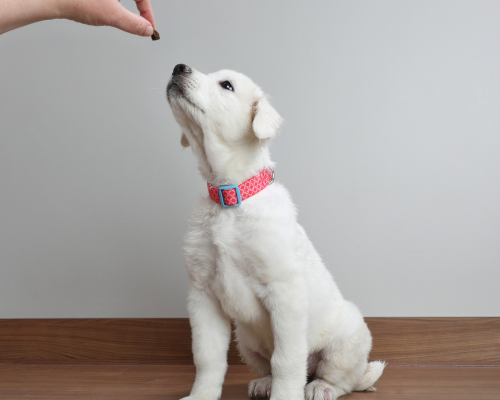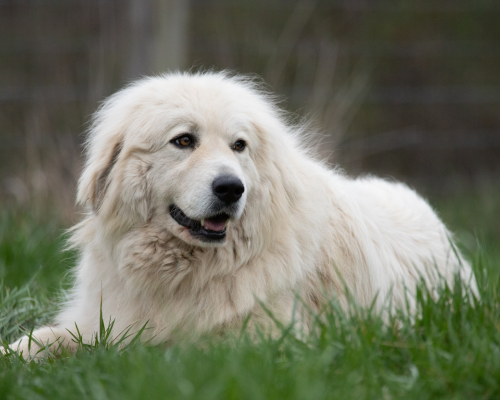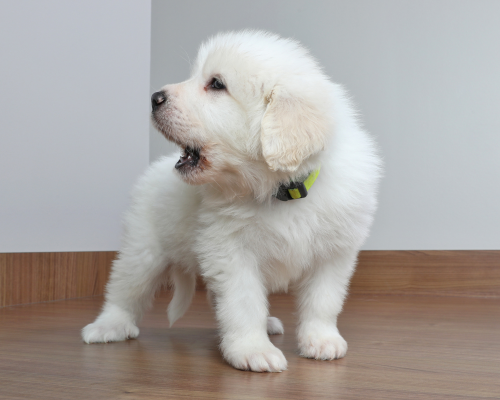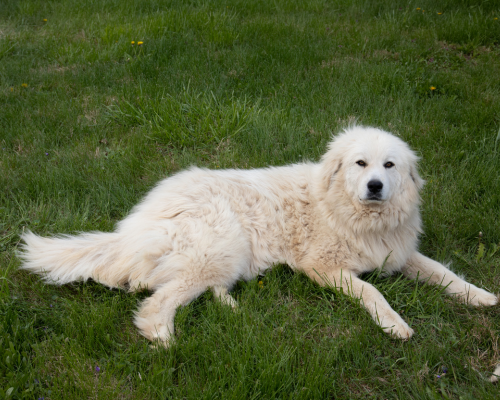How Much To Feed a Great Pyrenees? (Feeding Guide)
How Much To Feed a Great Pyrenees? (Feeding Guide)

Vet Reviewed

By: Sarah Hodgson
December 20, 2023
- Posted in Health
Table of Contents
Due to their large size, Great Pyrenees require a balanced and nutritious diet to support their size and energy levels. However, when it comes to figuring out the feeding size and schedule it can be quite confusing.
In this article, we will go over how much you need to feed your Great Pyrenees, their nutritional requirements, and provide you with a feeding schedule.
So let's dive in!
What Affects How Much You Need To Feed Your Great Pyrenees?
There are several factors that influence the amount of food your Great Pyrenees needs. The most important ones are age, whether they're active, weight, health, and metabolism.
Below we'll go over each one in detail:
1. Age:
The age of your Great Pyrenees plays a crucial role in determining their dietary requirements. Puppies, in their rapid growth phase, often need more frequent, smaller meals rich in essential nutrients. On the other hand, adult dogs have different nutritional needs that cater to maintaining their health and energy levels. Senior dogs may benefit from specialized diets that address aging-related concerns. Understanding the specific dietary needs at different life stages is essential to ensure your Great Pyrenees remains healthy and well-nourished throughout its life.
2. Activity Level:
The activity level of your Great Pyrenees is a key determinant in gauging their daily caloric intake. Highly active dogs, such as those engaged in agility training or regular exercise, require diets that match their increased energy expenditure. Conversely, sedentary dogs may be prone to weight gain, necessitating a controlled diet to prevent obesity-related health issues. Tailoring your dog's food intake to their activity level is fundamental to supporting their overall well-being and maintaining an optimal weight.
3. Weight:

The weight of your Great Pyrenees is a critical factor influencing their feeding regimen. Overweight dogs may benefit from a carefully monitored diet aimed at reducing caloric intake and promoting weight loss. Conversely, underweight dogs may require a higher calorie diet with a focus on nutrient-rich foods to help them reach and maintain a healthy weight. Regular weight assessments and adjustments to their diet accordingly contribute to your dog's long-term health and vitality.
4. Health Conditions:
The health condition of your Great Pyrenees can significantly impact their dietary needs. Dogs with specific medical conditions, such as allergies, digestive issues, or chronic illnesses, may require specialized diets to manage their health effectively. Working closely with your veterinarian to identify and address any health concerns ensures that your dog's diet aligns with their medical requirements, promoting overall well-being.
5. Metabolism:
The individual metabolism of your Great Pyrenees is a unique factor that influences their nutritional requirements. Dogs, like humans, have varying metabolic rates, affecting how efficiently they burn calories. Some dogs naturally have a higher metabolism and may require more calories to maintain a healthy weight, while others may need a more controlled diet to prevent excess weight gain. Understanding your dog's metabolic tendencies helps tailor their diet to meet their specific energy needs, promoting a balanced and healthy lifestyle.
The Daily Nutritional Requirements of Great Pyrenees
So now that we know what affects the amount of food you should be feeding your Great Pyress let's go over the daily nutritional requirements.
Great Pyrenees are a large breed with specific nutritional requirements. They require a balanced diet that includes high-quality protein, healthy fats, and a variety of carbohydrates. Protein is essential for muscle development and repair, while fats provide energy and support the health of their skin and coat. Carbohydrates provide a source of energy and fiber for digestive health.
Now let's go over how much of their diet should be these requirements.
- Protein plays a vital role, with adult dogs benefiting from a diet containing approximately 18-26% protein, while puppies in their growth phase may require a slightly higher percentage, ranging from 22-32%.
- Fat intake, ideally ranging from 5-15%, contributes to energy and overall health, with variations for puppies requiring more during their early stages.
- Carbohydrates, comprising 30-70% of the diet, can be sourced from whole grains and vegetables.
- Essential vitamins and minerals, including calcium and phosphorus, are crucial for bone health.
- Omega-3 and Omega-6 fatty acids, found in sources like fish oil, support skin and coat health.
- Providing fresh water at all times is super important.
How Much Should An Adult Great Pyrenees Eat In A Day?
The amount of food you should feed your Great Pyrenees depends on their age, weight, and activity level as we went over above.
As a general guideline, due to their large size adult Great Pyrenees typically require between 3 to 5 cups of high-quality dog food per day, divided into two meals.
Keep in mind, If your Great Pyrenees starts gaining weight, you may need to reduce their food intake, while weight loss may indicate the need for a slightly larger portion.

How Much Should Great Pyrenees Puppy Eat In A Day?
Great Pyrenees puppies have different nutritional needs compared to adult dogs. During their rapid growth phase, they require more calories and nutrients to support their development.
As a general guideline, a Great Pyrenees puppy should be fed around 1 to 2 cups of high-quality puppy food, divided into three to four meals per day.
It is important to talk with your veterinarian to determine the correct feeding amounts and frequency based on your puppy's age and weight. Not all puppies are the same.
How Frequently to Feed Your Great Pyrenees?
Now that we know how many cups of dog food to feed them per day how frequent and how many meals should it be?
The frequency of feeding your Great Pyrenees depends on their age. Puppies require more frequent meals compared to adult dogs. For the first few months, it is recommended to feed your Great Pyrenees puppy three to four times a day. As they grow older, you can gradually reduce the frequency to two meals per day. Adult Great Pyrenees should be fed twice a day, providing them with a balanced portion in each meal.
What Should a Great Pyrenees Feeding Schedule Look Like?
A consistent feeding schedule daily is important for the health of your Great Pyrenees as it gives them a kind of routine.
For example, a feeding schedule could look like this:
- 7:00 AM: Morning meal
- 12:00 PM: Mid-day snack (optional)
- 5:00 PM: Evening meal
Make sure you provide your Great Pyrenees with fresh water at all times, and avoid feeding them right before or after exercise to prevent digestive issues.

The Bottom Line
So there you have it, depending on their age, weight, activity level, and health that determines the appropriate portion sizes. We recommended feeding them 3-5 cups of dog food per day.
We didn't go over this much but choose a high-quality dog food formulated for large breeds. Happy feeding and happy eating to your Great Pyrenees!

Subscribe to Petfluence!
Get updates on the latest posts and more from Petfluence straight to your inbox.